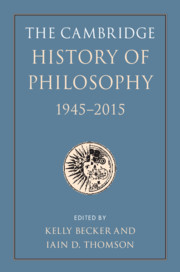Book contents
- The Cambridge History of Philosophy, 1945–2015
- The Cambridge History of Philosophy, 1945–2015
- Copyright page
- Contents
- Contributors
- Preface and Acknowledgments
- Introduction
- Part I Analytic Philosophy
- Part II Continental Philosophy
- Part III Bridge Builders, Border Crossers, Synthesizers, and Comparative Philosophy
- Part IV Epilogue: On the Philosophy of the History of Philosophy
- 52 Developments and Debates in the Historiography of Philosophy
- References
- Index
52 - Developments and Debates in the Historiography of Philosophy
from Part IV - Epilogue: On the Philosophy of the History of Philosophy
Published online by Cambridge University Press: 08 November 2019
- The Cambridge History of Philosophy, 1945–2015
- The Cambridge History of Philosophy, 1945–2015
- Copyright page
- Contents
- Contributors
- Preface and Acknowledgments
- Introduction
- Part I Analytic Philosophy
- Part II Continental Philosophy
- Part III Bridge Builders, Border Crossers, Synthesizers, and Comparative Philosophy
- Part IV Epilogue: On the Philosophy of the History of Philosophy
- 52 Developments and Debates in the Historiography of Philosophy
- References
- Index
Summary
History of philosophy, understood as the discipline of writing accounts of the history of philosophy,1 has always played an important role in philosophy, even if philosophers, at certain times and in certain traditions, have looked down on “mere” historians of philosophy. Philosophers will often motivate their own views by endorsing, developing, or criticizing the views of previous philosophers, whether charitably interpreted or caricatured, and hence will either draw on existing accounts of previous views or offer accounts of their own. But history of philosophy has itself undergone change over time – in its assumptions, methods and practices, and in its relationship to other disciplines and to the other fields of philosophy. History of philosophy has a history no less than any other field of philosophy, a history that reveals changing interrelationships with other fields of philosophy and other disciplines. This is as true of the period after 1945 as of any previous period of philosophy; indeed, debates about the relationship between philosophy and history of philosophy, in particular, have arguably been more vigorously pursued than ever before.
- Type
- Chapter
- Information
- The Cambridge History of Philosophy, 1945–2015 , pp. 725 - 758Publisher: Cambridge University PressPrint publication year: 2019
- 6
- Cited by

